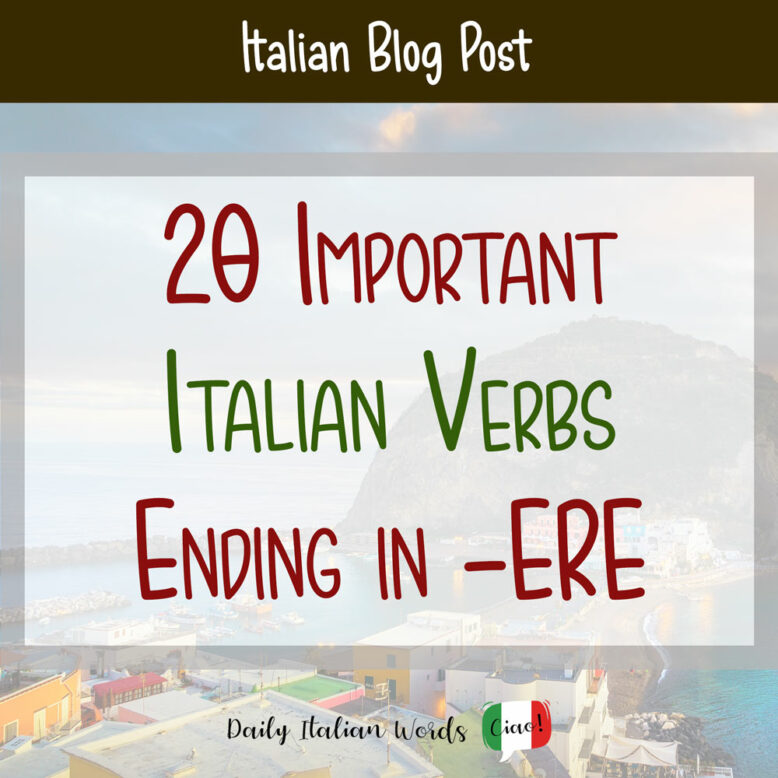Italian verbs can be divided into three families, called “conjugations”, based on the ending of the infinitive. Verbs ending in -are belong to the first conjugation, those in -ere to the second conjugation and those in -ire to the third conjugation. Avere (“to have”) and essere (“to be”) are the only exceptions since they belong to the so-called coniugazione propria.
How to conjugate -ERE verbs in Italian
Consider that, in order to conjugate verbs in the -ere group, you must remove the -ere ending and add the following suffixes:
- -o first-person singular (I)
- -i second-person singular informal (you)
- -e third-person singular (he/she/it) or second-person formal (you)
- -iamo first-person plural (we)
- -ete second-person plural (you all)
- -ono third-person plural (they)
Today we will take a closer look at the twenty most important Italian verbs ending in -ere while presenting some examples of sentences in which they are used. Let’s begin!

1. Bere
English meaning: to drink
Note: Bere is an irregular -ere verb, so it doesn’t follow the same conjugation pattern as other -ere verbs in the present tense. It derives from the Latin verb bevere, so we need to remove the ending from this original verb and add our endings.
(io) bevo = I drink
(tu) bevi = you drink (informal)
(lui) beve = he drinks
(lei) beve = she drinks
(Lei) beve = you drink (formal)
(noi) beviamo = we drink
(voi) bevete = you drink (plural)
(loro) bevono = they drink
Vorrei bere un bicchiere di vino.
I would like to drink a glass of wine.

2. Chiedere
English meaning: to ask
(io) chiedo = I ask
(tu) chiedi = you ask (informal)
(lui) chiede = he asks
(lei) chiede = she asks
(Lei) chiede = you ask (formal)
(noi) chiediamo = we ask
(voi) chiedete = you ask (plural)
(loro) chiedono = they ask
Ti chiedo un favore.
I ask you a favour.

3. Chiudere
English meaning: to close
(io) chiudo = I close
(tu) chiudi = you close (informal)
(lui) chiude = he closes
(lei) chiude = she closes
(Lei) chiude = you close (formal)
(noi) chiudiamo = we close
(voi) chiudete = you close (plural)
(loro) chiudono = they close
Giovanni chiude la porta.
Giovanni closes the door.

4. Conoscere
English meaning: to know
(io) conosco = I know
(tu) conosci = you know (informal)
(lui) conosce = he knows
(lei) conosce = she knows
(Lei) conosce = you know (formal)
(noi) conosciamo = we know
(voi) conoscete = you know (plural)
(loro) conoscono = they know
Conosci il significato di questo verbo?
Do you know the meaning of this verb?

5. Correre
English meaning: to run
(io) corro = I run
(tu) corri = you run (informal)
(lui) corre = he runs
(lei) corre = she runs
(Lei) corre = you run (formal)
(noi) corriamo = we run
(voi) correte = you run (plural)
(loro) corrono = they run
Corrono perché non vogliono mancare a lezione.
They are running because they do not want to miss the lecture.

6. Credere
English meaning: to believe
(io) credo = I believe
(tu) credi = you believe (informal)
(lui) crede = he believes
(lei) crede = she believes
(Lei) crede = you believe (formal)
(noi) crediamo = we believe
(voi) credete = you believe (plural)
(loro) credono = they believe
Quella donna crede in Dio.
That woman believes in God.

7. Decidere
English meaning: to decide
(io) decido = I decide
(tu) decidi = you decide (informal)
(lui) decide = he decides
(lei) decide = she decides
(Lei) decide = you decide (formal)
(noi) decidiamo = we decide
(voi) decidete = you decide (plural)
(loro) decidono = they decide
Decidi se preferisci il maglione rosso o blu.
Decide if you prefer the red or blue sweater.

8. Leggere
English meaning: to read
(io) leggo = I read
(tu) leggi = you read (informal)
(lui) legge = he reads
(lei) legge = she reads
(Lei) legge = you read (formal)
(noi) leggiamo = we read
(voi) leggete = you read (plural)
(loro) leggono = they read
Leggiamo insieme il primo libro della saga.
Let’s read the first book of the saga together.

9. Mettere
English meaning: to put
(io) metto = I put
(tu) metti = you put (informal)
(lui) mette = he puts
(lei) mette = she puts
(Lei) mette = you put (formal)
(noi) mettiamo = we put
(voi) mettete = you put (plural)
(loro) mettono = they put
Metto il libro sullo scaffale.
I put the book on the shelf.

10. Perdere
English meaning: to lose / to miss
(io) perdo = I lose
(tu) perdi = you lose (informal)
(lui) perde = he loses
(lei) perde = she loses
(Lei) perde = you lose (formal)
(noi) perdiamo = we lose
(voi) perdete = you lose (plural)
(loro) perdono = they lose
Il Milan ha perso la partita.
Milan lost the match.

11. Piangere
English meaning: to cry
(io) piango = I cry
(tu) piangi = you cry (informal)
(lui) piange = he cries
(lei) piange = she cries
(Lei) piange = you cry (formal)
(noi) piangiamo = we cry
(voi) piangete = you cry (plural)
(loro) piangono = they cry
Lei piange perché è morto il suo gatto.
She is crying because her cat died.

12. Prendere
English meaning: to take / to get / to pick
(io) prendo = I take
(tu) prendi = you take (informal)
(lui) prende = he takes
(lei) prende = she takes
(Lei) prende = you take (formal)
(noi) prendiamo = we take
(voi) prendete = you take (plural)
(loro) prendono = they take
Prendiamo il treno invece dell’aereo.
We’re taking the train instead of the plane.

13. Promettere
English meaning: to promise
(io) prometto = I promise
(tu) prometti = you promise (informal)
(lui) promette = he promises
(lei) promette = she promises
(Lei) promette = you promise (formal)
(noi) promettiamo = we promise
(voi) promettete = you promise (plural)
(loro) promettono = they promise
Ti prometto che starò in silenzio.
I promise that I will be silent.

14. Ridere
English meaning: to laugh
(io) rido = I laugh
(tu) ridi = you laugh (informal)
(lui) ride = he laughs
(lei) ride = she laughs
(Lei) ride = you laugh (formal)
(noi) ridiamo = we laugh
(voi) ridete = you laugh (plural)
(loro) ridono = they laugh
I tuoi amici ridono perché hai raccontato una barzelletta.
Your friends are laughing because you told a joke.

15. Scrivere
English meaning: to write
(io) scrivo = I write
(tu) scrivi = you write (informal)
(lui) scrive = he writes
(lei) scrive = she writes
(Lei) scrive = you write (formal)
(noi) scriviamo = we write
(voi) scrivete = you write (plural)
(loro) scrivono = they write
Ti scriverò una lettera.
I will write you a letter.

16. Sorridere
English meaning: to smile
(io) sorrido = I smile
(tu) sorridi = you smile (informal)
(lui) sorride = he smiles
(lei) sorride = she smiles
(Lei) sorride = you smile (formal)
(noi) sorridiamo = we smile
(voi) sorridete = you smile (plural)
(loro) sorridono = they smile
Sorridi sempre nelle foto.
You always smile in photos.

17. Vedere
English meaning: to see
(io) vedo = I see
(tu) vedi = you see (informal)
(lui) vede = he sees
(lei) vede = she sees
(Lei) vede = you see (formal)
(noi) vediamo = we see
(voi) vedete = you see (plural)
(loro) vedono = they see
Ti vedo anche se sono lontano.
I can see you even though I am far away.

18. Vendere
English meaning: to sell
(io) vendo = I sell
(tu) vendi = you sell (informal)
(lui) vende = he sells
(lei) vende = she sells
(Lei) vende = you sell (formal)
(noi) vendiamo = we sell
(voi) vendete = you sell (plural)
(loro) vendono = they sell
Ti vorrei vendere il mio computer.
I would like to sell you my computer.

19. Vincere
English meaning: to win
(io) vinco = I win
(tu) vinci = you win (informal)
(lui) vince = he wins
(lei) vince = she wins
(Lei) vince = you win (formal)
(noi) vinciamo = we win
(voi) vincete = you win (plural)
(loro) vincono = they win
Chi vince la sfida secondo te?
Who do you think is going to win the challenge?

20. Vivere
English meaning: to live
(io) vivo = I live
(tu) vivi = you live (informal)
(lui) vive = he lives
(lei) vive = she lives
(Lei) vive = you live (formal)
(noi) viviamo = we live
(voi) vivete = you live (plural)
(loro) vivono = they live
Vivo in un appartamento.
I live in an apartment.

Heather Broster is a graduate with honours in linguistics from the University of Western Ontario. She is an aspiring polyglot, proficient in English and Italian, as well as Japanese, Welsh, and French to varying degrees of fluency. Originally from Toronto, Heather has resided in various countries, notably Italy for a period of six years. Her primary focus lies in the fields of language acquisition, education, and bilingual instruction.


